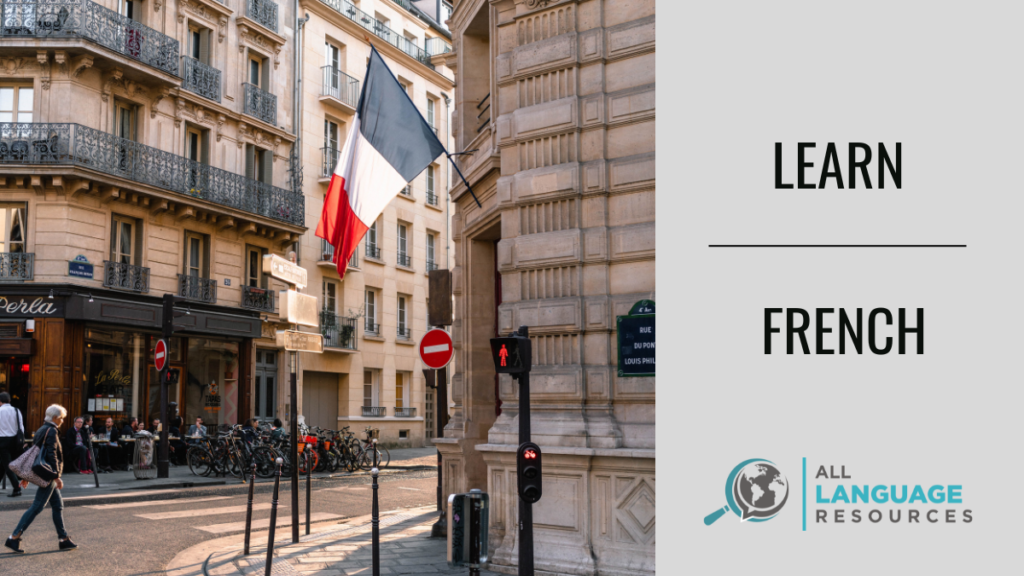Did you know that French is an official language in 28 other countries besides France? Some of them include Switzerland, Belgium, Senegal, and Mali, to name a few.
Additionally, it is one of the most spoken languages in the world with over 450 million native and non-native speakers around the world.
If you already know how to learn French based on your learning style and goals, and want to cut to the chase and read reviews and recommendations on various learning resources, read these posts:






Whether you’re touring France, moving to France for work or school, interested in French literature, or just like the language and culture and want to learn more about it, it’s smart to be well prepared.
In order to find the right French learning resource for you, it’s important to identify your learning needs and preferences. Keep reading, we’ll include what types of resources to consider and share some learning tips to keep in mind as you start learning French.
Table of Contents
How long does it take to learn French? Can I learn French in… Find out here. Learn French on your own with these practical tips, strategies, and resources.
How to Learn French On Your Own
Look for a good course that teaches listening, speaking, and reading in French (ideally one that uses immersion). As you work through the course, practice what you learn with native speakers. This is more or less the basic recipe for successfully learning French on your own. If you get stuck it’s perfectly okay to ask a tutor or language-learning partner for help.
How to Learn French as a Beginner
As a beginner, you should look for French language resources that cater to your language learning goals and your preferred learning style.
Take a French Course
One of the best ways to learn French is to work through a course that follows an immersion-based approach. Traditional French courses and classes use a translation method to teach you French. You’re given a list of French words with their English translations and you’re expected to memorize them or recall them during a quiz or exercise.
Immersion on the other hand teaches you French grammar and vocabulary in the context of larger conversations or stories. The idea here is that you listen to or read French that is just difficult enough to stretch your skills but not so difficult that it feels overwhelming.
The larger context of a conversation or story gives your memory a lot more information to attach itself to. You remember the people in the conversation, the situation being discussed, and even the emotions or feelings you feel while listening to or reading the text. All these work together to help the language come alive in a way that is both helpful and memorable.
Download an App for Learning French Language
Language learning apps are a fun and easy way to take your French studies with you wherever you go. Consistency is one of the most important parts of learning French. Apps help you practice French in the little spaces of free time spread across your busy day.
Subscribe to a French Podcast
Another great way to learn French is to subscribe to French podcasts. Podcasts are perfect for developing your listening and comprehension skills. They are also great for discovering new vocabulary. I recommend finding a podcast that includes full show transcripts so that you can follow along with the text while listening. Most podcasts focused on language learning will have transcripts.
Watch French Movies and TV
Watching French movies and television shows is a fun way to expose you to the language and pick up new words and phrases along the way. Once you have some basic French under your belt watching TV and movies in French will help you see how words and phrases are used in everyday speech.
Depending on your level in the language you can switch between using French or English subtitles. However, I highly recommend sticking to French subtitles.
Read French Stories and Books
Most French learners want to learn the language in order to speak it. As a result, they tend to focus more on listening and speaking skills. While this isn’t bad, you want to be careful not to neglect reading in French. Being able to read French will allow you to interact with the language on a deeper level.
Once you get to an upper beginner or intermediate level, reading will help you learn lots of new French words much faster than you would if all you did was speak the language. Just make sure whatever you’re reading is appropriate for your level.
Practice French Consistently
Like I said before, consistency is one of the biggest factors that determines your success in learning French. 15 minutes of French practice every day of the week will yield better results than 2 hours spent practicing one day a week.
Planning out a learning schedule and setting aside a specific time of day for studying French is a great way to help stay consistent. When you start out learning a foreign language it’s tempting to try and schedule huge chunks of time to study and practice. In my experience, this is a recipe for disappointment and discouragement.
Aim low when planning out your study schedule. Shoot for a target that’s easy to hit. Again, 15 minutes a day is probably better than 2 hours per day. If you try to start out learning French two hours a day you’re highly likely to get burnt out and become frustrated. 15 minutes on the other hand is much more doable and will leave you with a sense of accomplishment at the end of the day.
Book Online Lessons with a French Tutor
Online lessons with a French tutor will be beneficial for you no matter what level your French is at. A good French teacher will start beginners on the right path by teaching them things like correct pronunciation and relevant vocabulary.
Teachers can also help intermediate and advanced learners by helping them identify their weak points in the language and giving practical ways to strengthen their skills.
Visit a French-speaking Country
Visiting a French-speaking country can be the ultimate immersion experience. Nothing beats seeing for yourself how French is used by native speakers in their everyday lives. Not to mention you’ll get to take in the cultural and historical richness surrounding the French language.
Listen to French Music
Even if you’re completely new to the language, listening to music can be a fun and simple way to further immerse yourself in French. You don’t have to understand the lyrics to enjoy French music. As your French skills improve you can use songs to learn vocabulary. Lyricstraining is a free site that lets you listen to French songs and test your listening comprehension skills in real-time. If you’re a music lover it’s a resource you definitely want to check out!
Don’t Give Up on Learning French!
Every language learner hits plateaus and feels discouraged from time to time. Stick to learning French long enough and you will too. The important thing is that you don’t give up. It might feel like you’re not making any progress. But it’s important to remember that your progress in a new language won’t always be noticeable. Endure the valleys and you will reach mountain peaks. Remember consistency is key!
Best Way to Learn French for Kids
The best way to learn French for kids is to make French a part of your daily family lifestyle. This could mean reading French picture books at bedtime, singing songs in French together on a car ride, or even helping an older child in an after-school program or course to practice speaking French with peers.
Of course, if you are lucky enough to be fluent in French, you can raise your child bilingual by speaking to them in both French and English, too! This is probably the easiest way for a child to learn French.
What’s the Easiest Way to Learn French?
For many language learners, the easiest way to learn French is to work with a personal tutor who can tailor lessons to your specific learning goal. This means that you do not have to piece tougher your own learning plan, and you will even have built-in conversation practice if you pick a tutor who is a native French speaker!
Another factor to consider is that everyone has their own learning style. If you learn best visually, you may want to embark on an online course that uses a lot of videos and images.
What is the Most Effective Way to Learn French?
The most effective way to learn French is immersion. Immersion doesn’t necessarily mean moving to France and forcing yourself to only speak French (good luck with that if that’s what you decide to do though). Effective language immersion follows a tier or level-based approach.
Yes, you want to use only French when learning the language, but the French you interact with should be tailored to your level. Immersion for a beginner will look a lot different than immersion for an advanced learner. This is why we recommend courses that use an immersion-based approach. These courses break down the language into smaller, more digestible parts based on your level.
Are There Different Dialects of French?
Experts do not all agree on how many distinct dialects of French exist today, but there are at least 23 commonly used around the world!
These include Metropolitan or Standard French spoken in Paris and taught in most French courses; Belgian French; Swiss French; Québecois and Standard Canadian French spoken in Canada; Louisiana Cajun French (not the same thing as Louisiana Creole, which is a blend of French and other languages); and Haitian French, among others.
How Long Does it Take to Learn French?
If you’re a native English speaker and you want to learn French fluently, expect to spend anywhere from 6 months to a year and a half learning French. The exact amount of time it will take you to really learn French will depend on how much time you spend each day learning the language, and how consistent you are with your studies.
Can I Learn French in a Year?
The short answer is yes, you can learn French in a year. According to the US State Department’s Foreign Service Institute (FSI), the average native English Speaker will need 24 to 30 weeks to learn French proficiently. This assumes around 600 to 750 hours of classroom study during that time. This roughly translates to around 3.5 to 4.5 hours per day everyday learning French.
Given that 26 weeks is half a year exactly, you could divide the time spent studying French each day by two and study for a little over an hour each day to learn French in a year.
Can I Learn French in 6 Months?
Following the FSI’s guidelines, yes you can learn French in 6 months. Just be prepared to spend at least 3+ hours every day if you want to reach fluency. If your goal is a lower level of proficiency (like conversational French for instance), then you can plan to spend less time each day learning French.
How Can I Learn French in 30 Days?
The answer to this question depends a lot on your learning goals. You can’t expect to be fluent in French in just 30 days. However, you can expect to be conversational or literate in French by that time. If you want to learn French in 30 days it’s best to set a SMART goal and plan out your French learning around that.
For example, if your goal is to be conversational, then you should focus more on learning French phrases and vocabulary relevant to the conversation you hope to have with native speakers. If your goal is to start reading French then you’ll want to focus more on grammar and reading French text as much as possible.
How to Learn French Fast
The fastest way to learn French depends on your learning style and the amount of time and money you can pour into your language study. If you can afford to hire a tutor to work with you every day, for example, you will probably learn more quickly than a student who only has the time and money to use a free app for fifteen minutes a day.
But your own motivation plays a huge role in how fast you learn, too. If you set strong goals and commit to daily study, you can learn French pretty quickly!
Final Thoughts
As you can see with this small comprehensive guide, there are different ways to approach how to learn the French language. Do you want to converse in French? Learn to read so you can enjoy French books without translation? Are you planning to take a trip to a French-speaking country? There are so many ways to learn French based on your ultimate learning objectives!
No matter what your goals may be, experiencing a different language on your own terms is so liberating and makes you feel connected to the world. It will be a trial and error figuring out what method of French learning you find most beneficial, and the “best way” may well change as you progress! This is a path worth taking, and we are excited for you to take the first step!
Learn French with these Related Posts
- How Long Does It Take To Learn French: Answer 7 Questions And You Will Know!
- How to Learn French Fast: 12 Top Tips To Help You Learn Fast
- Forget About the Paywalls: Learn French for Free
- Most Recommended Resources For Learning French
- 125+ Resources for Learning French Online – Lots of Free Ones!
- French Upper Intermediate Practice Reading and Listening – Interesting Non-Fiction SimSums

